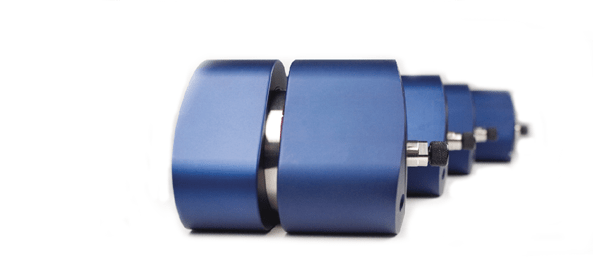
Preparative Liquid Chromatography
Preparative Liquid Chromatography
Preparative Liquid Chromatography (LC) is a powerful purification technique used to isolate target compounds from complex mixtures at a larger scale. Unlike analytical LC, which focuses on characterization, the primary goal of preparative chromatography is to obtain sufficient quantity and purity of the desired compound for further applications such as drug discovery, manufacturing, or biochemical studies.
The choice of separation mode—such as reversed-phase or normal-phase—depends on the chemical and physical properties of the analyte. The process typically begins by optimizing separations on analytical HPLC columns before scaling up to preparative columns for high-capacity purification. Preparative columns (often called “prep columns”) generally have an internal diameter of 20 mm or more and support flow rates between 10 and 200 mL/min. To ensure reproducibility, long column life, and consistent performance during large-scale purification, columns must be uniformly packed and free of fines or crushed media.

Phenomenex Preparative LC Column Portfolio
By combining innovative sorbent chemistry with consistent column packing, Phenomenex enables seamless scale-up from analytical to preparative workflows. This ensures that method development translates directly to larger purification runs, saving time, reducing solvent consumption, and maintaining purity standards critical to downstream applications.
Common Separation Modes Used in Preparative Liquid Chromatography
Different separation modes in preparative LC offer unique selectivity and scalability:
- Reversed-phase (RP) preparative chromatography: Ideal for peptides, proteins, and small molecules using hydrophobic sorbents like C18.
- Normal-phase (NP) preparative column chromatography: Suitable for non-polar compounds and structural isomers with polar sorbents such as silica.
- Ion-exchange (IEX) preparative LC: Enables purification of charged biomolecules such as nucleotides and proteins.
- Hydrophobic interaction chromatography (HIC): Used for antibodies and large biomolecules, leveraging hydrophobic interactions for recovery.
- Chiral preparative LC: Critical in pharmaceutical research for isolating pure enantiomers using chiral stationary phases (CSPs).
- Supercritical Fluid Chromatography (SFC): Uses supercritical carbon dioxide as the mobile phase to reduce solvent waste, method runtime, and fraction dry-down time.
Phenomenex provides preparative LC columns and sorbents tailored to each mode, supporting both small-scale method development and industrial-scale purification.
Applications of Preparative Liquid Chromatography
Preparative LC applications extend across multiple industries where high-purity compounds are required:
- Pharmaceuticals: Purification of APIs, intermediates, and enantiomers.
- Biotechnology: Isolation of proteins, peptides, oligonucleotides, and monoclonal antibodies.
- Natural Products: Extraction and separation of bioactive compounds, alkaloids, and nutraceuticals.
- Food and Beverage: Removal of contaminants and purification of additives or flavors.
- Environmental Testing: Isolation of trace organics, pollutants, and toxins.
This versatility makes preparative column chromatography indispensable in both research and manufacturing workflows.
Best Practices for Preparative LC Method Development and Scale-up
Successful preparative LC method development is a structured process that begins with a strong foundation at the analytical scale. Establishing reliable analytical conditions ensures a smooth and predictable transition to preparative purification.
- Analytical Method as the Foundation: Method development starts with optimizing separation parameters on an analytical column, which in the context of preparative LC is also called a scout column. Selecting the right column chemistry, ensuring mobile phase compatibility, and verifying sample solubility are critical to achieving sharp peaks and reproducible separations.
- Scaling Up to Preparative Chromatography: Scale-up is simplified by maintaining linear velocity rather than flow rate. Flow adjustments should be calculated based on column dimensions, and pilot runs must be closely monitored for peak shape, as distortions may indicate overloading or injection issues. For convenience, our Prep Calculator Tool can be used: https://www.phenomenex.com/tools/prep-calculator.
- Balancing Performance and Cost: High-capacity preparative columns, gradient optimization, and careful solvent management maximize yield while controlling costs. Running small-scale pilot experiments, conditioning columns, and following proper maintenance practices extend column life and improve long-term efficiency.
FAQ
What is the main purpose of preparative liquid chromatography?
Preparative LC is designed to isolate and purify compounds in usable quantities. The emphasis is on yield and purity rather than analytical characterization.
What is the difference between preparative and analytical chromatography columns?
Analytical columns are small, designed for detection and quantification. Preparative LC columns are larger, with higher capacity to purify milligram-to-gram or kilogram-scale quantities.
Can I use preparative LC for chiral compound separation?
Yes, chiral preparative LC is widely used to separate enantiomers. Chiral stationary phases, such as Phenomenex Lux columns, allow isolation of optically pure compounds.
What are common troubleshooting tips for preparative LC issues?
Ensure sample solubility, avoid overloading the column, and verify mobile phase compatibility. Regular column cleaning and conditioning also extend lifetime and performance.
How do I minimize solvent usage in preparative LC?
Optimize gradients, reduce flow rates, and select columns with higher loadability. Scaling methods from smaller columns before moving to full-size preparative LC systems also conserves solvents.












